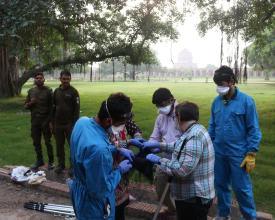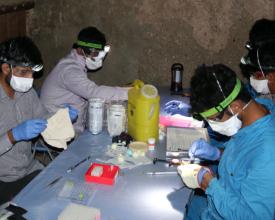Intégration de l'écologie des chauves-souris et de la surveillance des agents pathogènes : Le réseau de recherche sur les chauves-souris en Asie occidentale

Le réseau de recherche sur les chauves-souris en Asie occidentale (WAB-Net) vise à améliorer la conservation des chauves-souris et la détection des maladies zoonotiques par le biais d'une recherche collaborative et de formations axées sur le renforcement des capacités avec des biologistes spécialistes des chauves-souris, des virologues, des autorités gouvernementales et des universitaires de la région. Le WAB-Net coordonne la recherche sur les chauves-souris, les maladies zoonotiques et la dynamique hôte-virus dans sept pays. Cette approche proactive de la prévention des pandémies vise à identifier les virus zoonotiques avant qu'ils ne passent des chauves-souris hôtes à l'homme, ainsi que les facteurs de risque associés à cette propagation. Des formations sur le terrain, portant notamment sur l'utilisation correcte de l'EPI, la capture et la manipulation des chauves-souris et la gestion de la chaîne du froid, favorisent des résultats positifs pour la santé des humains et des chauves-souris. Tous les échantillons sont envoyés à deux laboratoires régionaux où des formations et des protocoles normalisés sont mis en œuvre, ce qui favorise la biosécurité et le progrès scientifique dans la région. La mission "chauves-souris pour la paix" du WAB-Net favorise des résultats renforcés à la fois en termes de découvertes scientifiques et de conversations politiques constructives.
Contexte
Défis à relever
La région de l'Asie occidentale est à la fois une région géopolitiquement controversée et une région sous-étudiée en termes de diversité et de distribution des espèces de chauves-souris et des virus qui leur sont associés. Malgré le rôle écologique et économique essentiel que jouent les chauves-souris dans le maintien d'écosystèmes sains dans le monde entier, les chauves-souris sont largement sous-estimées, surtout par rapport à d'autres espèces plus "charismatiques". Le WAB-Net relève de nombreux défis sociaux et environnementaux en trouvant des points communs et des intérêts partagés parmi les experts régionaux de One Health, ce qui a permis une communication ouverte, l'établissement d'un climat de confiance et le développement de relations de collaboration dans toute la région.
Emplacement
Traiter
Résumé du processus
L'approche One Health est intrinsèquement collaborative - en valorisant les résultats en matière de santé humaine, animale et environnementale et en reconnaissant leur interdépendance, One Health encourage la coordination entre les disciplines. Le WAB-Net utilise l'approche One Health et réunit des experts multisectoriels pour des discussions et des formations régionales. En incluant chaque secteur dans ses formations pratiques, le WAB-Net est en mesure de créer des équipes de terrain bien informées et diversifiées.
Blocs de construction
Approche proactive de One Health
Le WAB-Net adopte une approche "One Health" en menant des recherches collaboratives et des programmes de formation en Asie de l'Ouest, apportant une expertise régionale qui est autrement cloisonnée dans les secteurs de la santé humaine, animale et environnementale. Les échantillons prélevés sur les chauves-souris de la région sont analysés pour détecter les coronavirus connus et nouveaux ; les comportements humains susceptibles de présenter un risque de contagion sont identifiés. Le WAB-Net est le point de convergence des initiatives en matière de virologie, d'écologie des chauves-souris et de santé publique dans la région. En coordonnant les conversations entre les experts de divers domaines d'étude, il est possible de créer et de mettre en œuvre de nouvelles questions de recherche, des agendas plus complets et des recommandations politiques mieux informées.
Facteurs favorables
EcoHealth Alliance, qui compte des experts en matière de recherche et de politique mondiale sur l'initiative "Une seule santé", joue le rôle de facilitateur pour le WAB-Net et intègre l'initiative "Une seule santé" dans l'ensemble de ses travaux. L'expérience acquise en rassemblant des experts de divers domaines et en trouvant des points communs entre les sujets leur permet de mener à bien des projets multidisciplinaires dans une région politiquement instable.
Leçon apprise
Comme l'a démontré la crise mondiale COVID-19, les efforts d'atténuation après un débordement sont souvent plus coûteux pour la santé publique et les économies mondiales. Une approche proactive de la prévention des pandémies est possible grâce au travail du WAB-Net, qui surveille les virus potentiellement zoonotiques dans les populations de chauves-souris et le comportement humain. L'accent mis par le WAB-Net sur les objectifs de recherche et les efforts de formation renforce la biosécurité à toutes les étapes du processus de recherche. La nature collaborative de l'approche One Health permet de formuler des recommandations plus complètes et plus efficaces en matière de santé publique, d'efforts de conservation et de gestion des maladies.
Une formation collaborative et complète
Le WAB-Net rassemble des parties prenantes de divers secteurs et horizons pour participer à des formations pratiques et de renforcement des capacités particulièrement détaillées et approfondies. Des équipes de terrain composées d'écologistes, de fonctionnaires représentant les ministères de la santé et de l'environnement, d'étudiants et de professeurs d'université sont formées pour mener des recherches tout en assurant leur propre sécurité et celle des chauves-souris. Un écologiste spécialiste des chauves-souris passera plusieurs semaines par an sur le terrain pour enseigner à l'équipe comment capturer, manipuler, échantillonner et relâcher les chauves-souris, en tenant compte des considérations de biosécurité à chaque étape.
Facteurs favorables
Un écologiste spécialiste des chauves-souris connaissant bien les aspects uniques du groupe taxonomique et les pratiques de biosécurité travaille en collaboration avec les partenaires régionaux du projet pour concevoir des protocoles de terrain standardisés et met ensuite en œuvre les formations sur le terrain dans chaque pays. Cette approche pratique unique de la formation des équipes de terrain garantit la normalisation des protocoles de terrain à travers les cultures et les disciplines de la région.
Leçon apprise
Le WAB-Net sert de point central de coordination pour ces formations dans toute la région de l'Asie occidentale. Les parties prenantes qui y participent sont très diverses, notamment en ce qui concerne leurs antécédents et leurs domaines d'expertise. Les animateurs du WAB-Net apprennent des personnes qu'ils forment, ce qui permet de créer des leçons plus pertinentes d'un point de vue culturel. En apportant des leçons d'un pays à l'autre, le WAB-Net peut favoriser les conversations et la collaboration dans des domaines d'intérêt commun, en favorisant des partenariats qui auraient été autrement difficiles à mettre en place sur le plan politique.
Impacts
L'Asie occidentale a été historiquement négligée en raison de son importance écologique pour les espèces de chauves-souris. Le travail du WAB-Net comble les lacunes en matière de connaissances et de sensibilisation dans cette région carrefour. La standardisation des protocoles dans les deux laboratoires régionaux où tous les échantillons diagnostiques sont testés améliore l'efficacité et augmente la capacité des scientifiques à répéter les processus et à comparer les résultats. Les formations dispensées sont particulièrement approfondies et pratiques, les scientifiques passant souvent des semaines dans le pays avec les équipes de terrain pour montrer les procédures de biosécurité et d'échantillonnage non létal appropriées. Cela favorise les relations à long terme et permet de collecter des données écologiques supplémentaires, ce qui fait progresser les objectifs scientifiques et de conservation généraux. La nature collaborative du travail du WAB-Net joue également un rôle essentiel dans l'établissement et le maintien de relations au-delà des cultures, des religions et des frontières nationales.
Bénéficiaires
- L'homme dans la région, sa santé et son bien-être
- Espèces de chauves-souris dans la région, leur santé et leur conservation
- La population humaine mondiale, grâce à la prévention des pandémies et à l'amélioration de la dynamique géopolitique.


